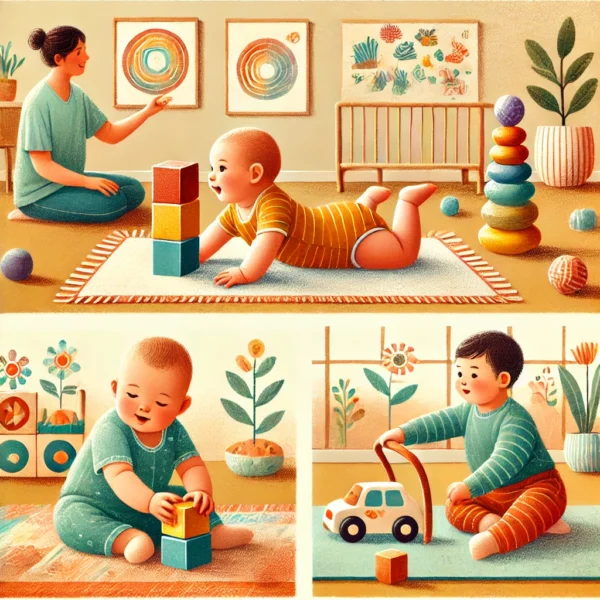Building Strength and Coordination: A Guide to Motor Skills Development in Babies

Motor skills development is an essential part of baby care, helping infants learn to control and coordinate their bodies. These skills allow babies to explore, interact with their environment, and gain independence as they grow. Motor skills are divided into two categories: gross motor skills and fine motor skills. Gross motor skills involve larger movements, like crawling or walking, while fine motor skills focus on smaller, more precise movements, such as grasping objects.
1. Supporting Gross Motor Development
Gross motor skills help babies gain strength, balance, and coordination. As babies grow, they progress through important milestones, such as lifting their heads, rolling over, sitting up, crawling, and eventually standing and walking. You can support these stages in simple ways:
- Tummy Time: Tummy time helps babies build neck, shoulder, and core strength, which are crucial for other motor milestones. Start with a few minutes each day, gradually increasing as your baby becomes more comfortable.
- Encourage Crawling: Place toys slightly out of reach to encourage crawling, which improves coordination and builds strength. Crawling also supports cognitive development by helping babies explore and learn spatial awareness.
- Create Safe, Open Spaces: Babies need room to move freely and practice skills like rolling, scooting, and eventually walking. Make sure they have a safe, open space where they can explore and practice movement.
2. Encouraging Fine Motor Skills
Fine motor skills involve using smaller muscles in the hands and fingers, which are essential for grasping, picking up objects, and eventually tasks like feeding and dressing. Some ways to encourage fine motor development include:
- Toys for Grasping: Soft rattles, textured toys, and small objects that are safe to handle help babies learn to grasp and hold onto things, strengthening hand muscles and improving coordination.
- Finger Feeding: Around six to eight months, babies begin developing the pincer grasp, allowing them to pick up small objects between their thumb and forefinger. Offering small, soft foods helps them practice this skill while fostering independence.
- Play with Textures: Sensory play with items of different textures, like soft fabric, crinkly paper, or rubber, helps babies explore how to use their hands and fingers effectively, enhancing both motor skills and sensory awareness.
3. Interactive Playtime for Both Gross and Fine Motor Skills
Interactive playtime combines the benefits of gross and fine motor skill development. Simple activities can stimulate both types of motor skills:
- Stacking Blocks: Stacking and knocking down blocks or cups encourage hand-eye coordination and build strength in hands and fingers.
- Pushing and Pulling Toys: Once babies are learning to stand and walk, toys they can push or pull help them develop balance, coordination, and control over their movements.
- Clapping, Waving, and Pointing: These simple gestures are great for improving hand control and coordination and help babies engage with others, further enhancing their social development.
4. Creating a Safe Environment for Movement
Safety is vital to allow babies to move, explore, and experiment freely. Baby-proofing the home, especially areas where they spend a lot of time, ensures they can crawl, pull themselves up, and eventually walk with minimal restrictions. Keep an eye on potential hazards and create a space where they can practice and refine their motor skills without constant intervention.
5. Be Patient and Follow Their Lead
Every baby develops motor skills at their own pace. Milestones are general guidelines, so allow your baby to reach them naturally. Be there to encourage and support without rushing or putting undue pressure on them. Celebrate each new skill they master, from the first grasp to the first step, as these are exciting accomplishments in their development.
Motor skills development forms a foundation for many aspects of a child’s life, supporting future skills like handwriting, sports, and everyday self-care tasks. With a supportive, patient approach, you’re helping your baby gain confidence, strength, and coordination that will serve them throughout childhood and beyond.


